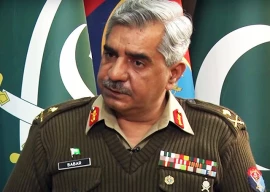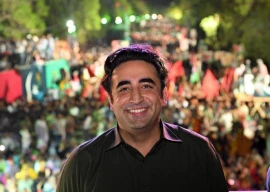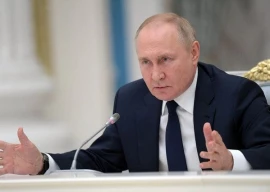1657290070-0/image-(22)1657290070-0.png)
US Secretary of State Antony Blinken called up Bilawal Bhutto-Zardari earlier this week to follow up on his young Pakistani counterpart’s maiden official visit to Washington in May. Pakistan’s Ministry of Foreign Affairs issued a statement listing an array of issues the two officials discussed. The list didn’t mention one issue the Biden administration has of late been vigorously pursuing in bilateral engagements with all countries: the Ukraine conflict.
But was it even discussed?
Going by MOFA, it wasn’t. The State Department, however, says it was.
As per the statement shared by MOFA on its Twitter handle, FM Bilawal a.) reiterated mutual commitment to deepen Pak-US ties marking #PakUSAt75; b.) looked forward to frequent exchange of high-level visits; c.) requested to ease issuance of visas for Pakistani nationals; d.) appreciated the ongoing visit of special representative Dilawar Syed; e.) stressed solidifying Pak-US trade & commercial ties; f.) reaffirmed mutual cooperation in energy, health, security & economic development; g.) discussed the need for continuous engagement with the interim Afghan government to deal with a humanitarian crisis.
FM @BBhuttoZardari received a phone call from @SecBlinken, today.
— Spokesperson 🇵🇰 MoFA (@ForeignOfficePk) July 6, 2022
➖Reiterated mutual commitment to deepen Pak-US ties marking #PakUSAt75
➖Looked forward to frequent exchange of high-level visits
➖Requested to ease issuance of visas for Pakistani nationals.
🇵🇰🤝🇺🇸 pic.twitter.com/vBGQgAGGC9
Nowhere does it mention Russia, Putin, or Ukraine war.
Bilawal also told his Twitter followers what he had discussed with Blinken. “We reaffirmed our mutual desire to further strengthen bilateral ties by expanding our engagement in trade, energy, health & security marking 75 years of our relationship. We must increase people-to-people & business to-business contacts,” he wrote on the micro-blogging site.
Spoke to @SecBlinken, today. We reaffirmed our mutual desire to further strengthen bilateral ties by expanding our engagement in trade, energy, health & security marking 75 years of our relationship. We must increase people-to-people & business-to-business contacts. 🇵🇰 🤝 🇺🇸
— BilawalBhuttoZardari (@BBhuttoZardari) July 6, 2022
He didn’t mention the Ukraine war, either.
However, the State Department spokesperson claimed that the “devastating effects of Putin’s unprovoked war” was one of the talking points.
The secretary welcomed the 75th anniversary of diplomatic relations between the US and Pakistan and reaffirmed our joint goals for enhancing US-Pakistan bilateral partnerships on economic stability, climate, and health, Ned Price said in a tweet.
.@SecBlinken and Pakistani Foreign Minister @BBhuttoZardari spoke today about our joint goals for economic stability. We look forward to expanding our ties. #PakUSAt75 https://t.co/PpqT9nPzOW
— Ned Price (@StateDeptSpox) July 6, 2022
“The secretary and the foreign minister also discussed coordination to mitigate the humanitarian crisis in Afghanistan, regional stability, commercial and people-to-people ties, and the devastating effects of Putin’s unprovoked war on Ukraine on food security in Pakistan and worldwide,” he said.
Also read: Imran believes Pakistan’s future is tied to Russia
This begs the question: If the Ukraine war was discussed, as Price claims, then why the MOFA statement doesn’t have its mention?
Does this mean Pakistan’s policy vis-à-vis Russia and the Ukraine war has changed? If so, why the government wants to keep it on the hush?
Tellingly, there has been a flurry of high-level contacts between Pakistan and the United States since the exit of Imran Khan from power. Bilawal undertook his maiden official visit to the US after taking over as FM where he met Secretary Blinken for the first time.
MOFA and Bilawal didn’t say Russia or Ukraine war came up for discussion during the US trip, but Price claimed at the time that Blinken had discussed “support for Ukraine, and democratic principles”.
The US didn’t have a full-time ambassador in Pakistan throughout Khan’s time in the Prime Minister’s Office. A chargé d'affaires looked after the US diplomatic mission in Islamabad. As soon as Khan was ousted in April, Donald Blome was sworn in as US ambassador to Pakistan.
High-level exchanges came close on the heels. Special Representative for Commercial and Business Affairs Dilawar Syed and Assistant Secretary of State for International Narcotics and Law Enforcement Affairs Todd D Robinson arrived in Pakistan in what is seen as a sign of thaw in the frosty bilateral relationship between the two nations.
If Pakistan’s policy vis-à-vis the Ukraine war remains unchanged, what caused the change of heart on Capitol Hill?
Khan was unceremoniously removed from power by a rainbow alliance of his political rivals in April. But he calls it a “regime change” operation scripted, choreographed, and funded by the US and executed by its abettors in Pakistani politics.
Why would the US do that? Khan claims Washington wanted to exact revenge on him for his refusal to call off a February visit to Moscow. The trip had coincided with the launch of Russia’s “demilitarisation and denasification” operations in Ukraine which the US and its allies have condemned.
Khan calls it mere coincidence. He refuses to condemn Russia, irrespective. Neither does he call it “invasion or aggression”.
Surprisingly, while Khan [then prime minister] publicly criticised the West for urging his government to pick sides in the Ukraine war, his military chief said Russia’s “aggression against a smaller country cannot be condoned” despite Moscow’s legitimate security concerns.
“Sadly, the Russian invasion against Ukraine is very unfortunate as thousands of people have been killed, millions made refugees and half of Ukraine destroyed,” COAS Gen Qamar Javed Bajwa told an international security dialogue in Islamabad in a move seen by analysts as an attempt to ease diplomatic tensions with Washington exasperated by Khan’s relentless criticism of the US.
Gen Bajwa’s damage control came nearly a week before Khan was voted out of power in a high-octane midnight drama after he lost the crucial trust vote in parliament, becoming Pakistan’s first premier to be sent packing through a no-confidence motion.
After his humiliating exit, Khan has consistently peddled the US conspiracy theory as a rallying call in a country where anti-Americanism is rampant. And his story found hundreds of thousands of willing takers, even though the military and intelligence agencies have repeatedly tried to punch holes in it.
To his followers, the “foreign plot” narrative makes perfect sense based on the chronology and coherence of the events leading up to the cobbling of the fissiparous coalition of socialist, liberal, and radically religious parties to execute the plot through the no-trust vote.
Also read: FM Bilawal, US envoy discuss ways to strengthen trade ties
Khan seeks to sell himself as the lone crusader for the nation’s sovereignty in a country ruled by what he calls a “self-serving cabal of spineless crooks”. He also tries to promote himself as an advocate of independent foreign policy who faced the US vengeance for refusing to join the Western chorus of Russia condemnation and choosing to stay neutral on the Ukraine war.
PTI supporters believe the sudden warmth in the US ties shows the “imported government” might have given in to Washington or at least assuaged American concerns about Pakistan’s Ukraine war policy. It, however, might be avoiding public acknowledgment fearing this might discredit the ruling coalition and strengthen Khan’s narrative instead.
If this is true [wish it’s not], then it means that our feeble attempt to break away from bloc politics has been aborted as Pakistan tilts towards the US-led Western bloc on the Ukraine war. And with this dashes any hope of a foreign policy breakthrough with Russia.













































COMMENTS
Comments are moderated and generally will be posted if they are on-topic and not abusive.
For more information, please see our Comments FAQ